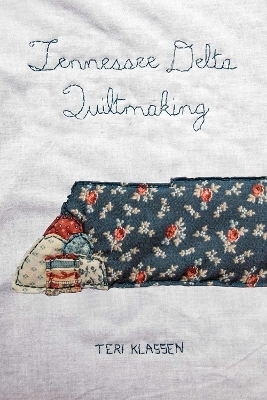
Tennessee Delta Quiltmaking
Seiten
2017
University of Tennessee Press (Verlag)
978-1-62190-270-6 (ISBN)
University of Tennessee Press (Verlag)
978-1-62190-270-6 (ISBN)
- Titel z.Zt. nicht lieferbar
- Versandkostenfrei
- Auch auf Rechnung
- Artikel merken
Though scholars have studied quilt styles with rural southern roots, few have considered black and white quiltmakers together or as part of a shared regional culture. Through interviews with people from rural households, Klassen uncovers the ways in which designs and labor were shared and the ways in which quiltmaking was part of the small-farm culture that was common to blacks and whites.
Prior to the 1960s, quiltmaking thrived in the cotton-rich Tennessee Delta as a crucial source of warm bedcovers among cash-poor yet self-sufficient farm households. But as agriculture mechanized, rural workers switched to factory jobs and could afford nicer houses and electric blankets. Quiltmaking survived because women—both black and white—reinvented it as a hobby that met personal and social needs. Though scholars have studied quilt styles with rural southern roots, few have considered black and white quiltmakers together or as part of a shared regional culture.
In Tennessee Delta Quiltmaking, Teri Klassen traces how mid-twentieth-century common quilts developed from nineteenth-century styles. Through interviews with people from rural households, Klassen uncovers the ways in which designs and labor were shared and the ways in which quiltmaking was part of the small-farm culture that was common to blacks and whites. While quiltmaking was a creative form passed down in families, limited means and accessible materials (such as home-grown cotton for batting) made it both a necessity and a highly evolved custom in southwestern Tennessee’s upper Delta region. For families in this region, the quilt symbolized homemaker competence and self-reliance, a trait especially valued by sharecroppers and tenant-farmers who owned no land. The culture of quiltmaking reflected living conditions and values of these folk, and Klassen details numerous changes in this culture, from how it contributed to small-farm stability to how industrialization affected the practice.
By considering quiltmaking’s practical, aesthetic, and social aspects in a historical, mixed-race context, Tennessee Delta Quiltmaking makes a unique contribution to the study of the Tennessee Delta and the understanding of common-quilt design.
Prior to the 1960s, quiltmaking thrived in the cotton-rich Tennessee Delta as a crucial source of warm bedcovers among cash-poor yet self-sufficient farm households. But as agriculture mechanized, rural workers switched to factory jobs and could afford nicer houses and electric blankets. Quiltmaking survived because women—both black and white—reinvented it as a hobby that met personal and social needs. Though scholars have studied quilt styles with rural southern roots, few have considered black and white quiltmakers together or as part of a shared regional culture.
In Tennessee Delta Quiltmaking, Teri Klassen traces how mid-twentieth-century common quilts developed from nineteenth-century styles. Through interviews with people from rural households, Klassen uncovers the ways in which designs and labor were shared and the ways in which quiltmaking was part of the small-farm culture that was common to blacks and whites. While quiltmaking was a creative form passed down in families, limited means and accessible materials (such as home-grown cotton for batting) made it both a necessity and a highly evolved custom in southwestern Tennessee’s upper Delta region. For families in this region, the quilt symbolized homemaker competence and self-reliance, a trait especially valued by sharecroppers and tenant-farmers who owned no land. The culture of quiltmaking reflected living conditions and values of these folk, and Klassen details numerous changes in this culture, from how it contributed to small-farm stability to how industrialization affected the practice.
By considering quiltmaking’s practical, aesthetic, and social aspects in a historical, mixed-race context, Tennessee Delta Quiltmaking makes a unique contribution to the study of the Tennessee Delta and the understanding of common-quilt design.
Teri Klassen is a postdoctoral research associate at the Mathers Museum of World Cultures at Indiana University. Her articles have appeared in Journal of American Folklore, Midwestern Folklore, Uncoverings (American Quilt Study Group journal), and Journalism Quarterly.
| Erscheinungsdatum | 01.02.2017 |
|---|---|
| Zusatzinfo | 16 colour inserts |
| Verlagsort | Chicago |
| Sprache | englisch |
| Maße | 178 x 254 mm |
| Gewicht | 440 g |
| Themenwelt | Kunst / Musik / Theater |
| Sachbuch/Ratgeber ► Freizeit / Hobby ► Handarbeit / Textiles | |
| Geisteswissenschaften ► Geschichte ► Regional- / Ländergeschichte | |
| Sozialwissenschaften ► Ethnologie | |
| Sozialwissenschaften ► Soziologie | |
| ISBN-10 | 1-62190-270-6 / 1621902706 |
| ISBN-13 | 978-1-62190-270-6 / 9781621902706 |
| Zustand | Neuware |
| Haben Sie eine Frage zum Produkt? |
Mehr entdecken
aus dem Bereich
aus dem Bereich
über 70 Geheimtipps für entspanntes Stricken
Buch | Softcover (2024)
Stiebner (Verlag)
CHF 29,90
niedliche Tiere in Groß und Klein häkeln
Buch | Softcover (2024)
EMF Verlag
CHF 26,90


